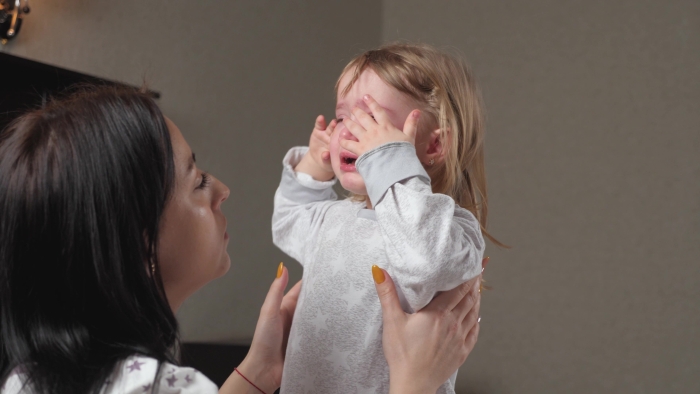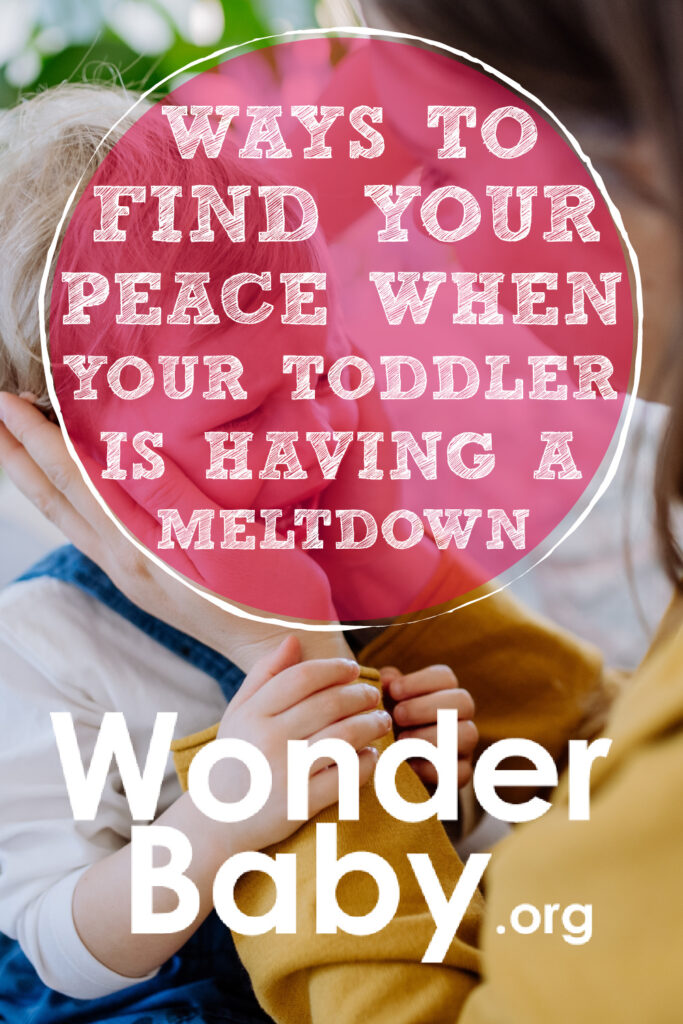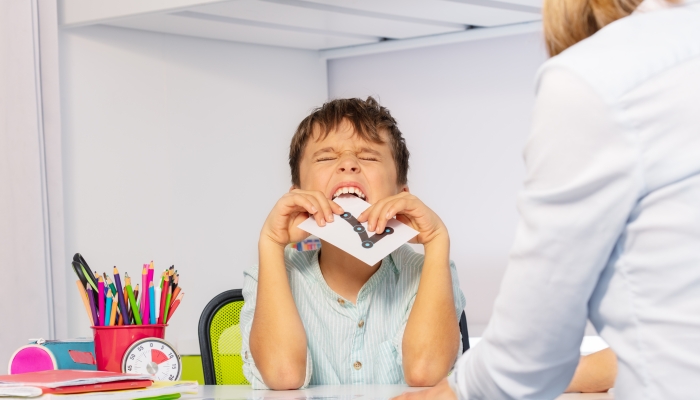7 Ways To Find Your Peace When Your Toddler Is Having a Meltdown

- Being mindful can help you stay calm during your child’s meltdown.
- It’s important to set the tone and encourage safe behavior during intense emotional moments.
- You should never ignore your toddler or retaliate by yelling when they have a meltdown.
- Understanding why meltdowns happen can help you find better ways to deal with them.
My husband and I had no idea how to handle toddler meltdowns when our firstborn started having them. It was incredibly frustrating and exhausting to deal with. Soothing an overwhelmed baby seemed much simpler in these moments! Now that our second is reaching toddlerhood, we know better.
Staying calm and present when your child is dealing with big emotions is essential. Kids learn from our behavior. However, finding peace amongst screams, inconsolable cries, and perhaps kicking or hitting is difficult.
Our daughter often had rage attacks during her meltdowns. We couldn’t hold her, comfort her with words, or distract her from what she was feeling. Besides figuring out how to handle her meltdowns best, we had to find coping strategies for ourselves. Today, I’m sharing them with you!
In this article, you’ll find seven effective ways to keep yourself and your child calm during their meltdown.
Why Do Toddlers Have Meltdowns?

Toddlers can have intense meltdowns. Understanding why this happens will help you find better ways to deal with it. Meltdowns are often triggered by seemingly minor things. Here’s what could cause big feelings for your little one:
Developmental Changes
Toddlers go through a lot of changes as they grow and develop. They’re learning new skills, exploring their environment in new ways, and becoming more independent. All of this can be overwhelming for them.
Young children also have limited communication skills. This makes it difficult to express their needs and emotions during developmental changes.
Overstimulation
Your toddler has a sensitive nervous system. It’s easy for them to become overstimulated. Their surroundings or activities could lead to this. Too much noise, bright lights, or too many people can also lead to sensory overload. Equipping yourself with the right skills to deal with sensory overload can help you manage overstimulation when it causes a meltdown.
Hunger and Fatigue
It might not seem so when your little one gobbles a ton of candy or goes days without eating anything other than yogurt, but your toddler has a small stomach. You need to ensure they have access to frequent meals and snacks. When small children are hungry, their blood sugar levels can drop drastically. This often leads to irritability and meltdowns.
The same is true when they are tired. Toddlers might fight against sleep more than anything, but they need a lot of it for proper development. Without enough rest, your little one will become cranky and prone to meltdowns.
A Lack of Control
When toddlers begin to understand that they have some control over their environment, they also realize they have limited autonomy. This lack of control can frustrate them. A meltdown can be triggered when your child can’t control what they get or how they get it.
Big Feelings
Your toddler will experience a wide range of big emotions in a day, from joy and excitement to anger and frustration. They’re still learning to regulate these feelings. When it becomes overwhelming, they can have a meltdown.
Frequent meltdowns are a natural part of development. You should remember that it’s a form of communication for your toddler. The best thing you can do for your screaming child is help them manage their feelings.
What Should I Do for My Child During Their Meltdown

It’s your job to help your toddler feel heard, understood, and supported during a meltdown. If you ignore their behavior or retaliate by yelling, you’ll both feel overwhelmed. Your child is not misbehaving on purpose. Here are five ways you can help them during their meltdown:
Validate Your Child’s Feelings
Validating what your toddler experiences is a big part of teaching them how to regulate their emotions. Acknowledging how they feel, even when you disagree with their behavior, can show them that their feelings are important and you understand what they’re going through.
Make eye contact and use simple language to describe what you think your child is feeling. Avoid telling them to “calm down,” and instead say, “I see you’re upset right because you wanted to keep playing.”
Offer Your Child Comfort
Comforting your child during their meltdown can help them feel safe and secure. There’s a chance your toddler won’t want you near or touching them, which is okay too. Comfort looks different for each child.
If yours doesn’t want a hug or to be held, you can stay near them and offer reassuring words. Giving your toddler some space and letting them know they can come to you when they’re ready can help them feel supported and in control.
Meet Your Child’s Needs
Always try to meet your child’s needs during a meltdown. If they haven’t eaten in a while, offering a snack and something to drink is sometimes all it takes to decrease the intensity of their breakdown. You can also calm an overtired child by soothing them to sleep.
If you’re at the park and your toddler refuses to leave, allowing them to finish whatever they were busy doing can get them to cooperate. Similarly, if your toddler doesn’t want to dress in the clothes you picked out for them, you can give them options to make them feel more in control.
Redirect Your Child’s Attention
Redirecting your toddler’s attention can help them move on from their meltdown. When young children feel angry, sad, or frustrated, reminding them of something exciting that awaits them or another item that can bring them joy does the trick. You can try to focus your child’s energy on a new toy or suggest a different activity.
Offer Your Child Sensory Input
Sensory meltdowns happen when toddlers have intense feelings of distress, anxiety, or even pain in response to sensory input that you might find normal. Loud noises, bright lights, overwhelming smells, and a sudden change in routine could all trigger a sensory meltdown.
If you think your child is experiencing a sensory meltdown, you can calm them by removing the sensory input that might be causing it. Another solution is offering a different sensory input. This can include a stuffed animal, sensory bottle, a squeeze ball, or taking deep breaths together.
What Should I Do for Myself During My Child’s Meltdown? 7 Tips To Withstand the Storm!
When your young child is screaming, crying, having a breath-holding spell, or lashing out at others, it can be incredibly stressful for you as a parent. It’s important to take care of yourself while this happens. Knowing how to stay calm during a toddler meltdown will help you remain present for your child.
During a recent discussion in Stay At Home Mom: Real Life (a Facebook support group), Megan Gaetz shared how she finds peace when her child is feeling overwhelmed:
I agree with her approach. Taking deep breaths and recognizing that your child’s emotions are not yours is one of the first things you can do when your child is having a meltdown.
- Regulating your breathing will slow your heart rate and relax your nervous system.
- Separating your emotions from what your child is experiencing will help you avoid becoming overwhelmed and keep you in a calmer, more focused state.
Here are five more tips:
Slow Down: Learning to slow down and think about what’s happening can help you respond better. When your child is having a meltdown, you should pause, process, plan, and then proceed. Avoid panicking and hasty reactions.
Center Yourself: Find a special item around the house or wear a bracelet that will remind you that your child is not giving you a hard time. It may feel so, but remembering that your toddler is dealing with big emotions and having a hard time can help you stay calm.
You can also use this item to remember how you want to raise your children. This can help you make the right decisions in a moment of irritability.
Don’t Talk, Listen: You’ll drive yourself crazy trying to talk over your upset child. Ask your toddler what’s wrong, and wait for their response. Repeating yourself or trying to drown the screams with words will leave both you and your toddler more frustrated.
Ask for Help: It’s always okay to ask for help. If you’re feeling overwhelmed and your toddler won’t calm down, reaching out to your partner, a friend, or a nearby family member is a good idea.
Take a Break: If you don’t have anyone around who can step in to help, give yourself a few seconds of space from your child. Move to a different room if your child is in a safe environment. Take a few breaths, and ground yourself with a quick snack or sensory tool.
How Can We Avoid Meltdowns Altogether?

It’s impossible to avoid meltdowns altogether. Toddlers and older kids can be triggered by many factors. However, some strategies can help prevent frequent meltdowns and minimize their intensity.
Sticking To a Routine
Establishing a consistent daily routine can help your toddler feel more secure and in control. Routines provide predictability. Young children feel less anxious and stressed when they know what to expect.
This doesn’t mean you need to have every minute of the day scheduled. Your routine could be bathing and reading a book before bed every night. You can also create a visual schedule to help your child understand what’s happening throughout the day.
Providing Choices
Giving your child a choice can help them feel more in control and empowered. Independence can reduce the likelihood of a meltdown. Offering choices within reasonable limits can also help your child feel more invested in the outcome.
Here are two examples:
- Instead of telling your toddler which snack to eat, offer them a choice between options you prefer they have.
- Instead of taking them away from the park without notice, offer them a chance to choose one last activity before you go.
Identifying Triggers
Pay attention to what triggers your child’s meltdowns. Common triggers include hunger, fatigue, overstimulating, transitions, and lack of control. Your child might also tend to have meltdowns at specific times or in particular situations.
Once you identify triggers, you can plan ahead or prepare your child in advance.
Is There a Difference Between Meltdowns and Temper Tantrums?
It can be hard to differentiate between toddler tantrums and meltdowns. Similarly to meltdowns, tantrums occur when children feel frustrated, overwhelmed, or struggle to communicate something. Your tantruming child might scream, cry, or throw themselves on the ground.
Unlike meltdowns, you can’t prevent tantrums by looking for triggers. A tantrum is sudden and unexpected. You can, however, manage them.
Finding effective ways to communicate, managing your child’s expectations, and setting clear boundaries can help. Temper tantrums are a normal part of development and will typically decrease as your child learns to regulate their emotions.
If your child’s tantrum is in response to not getting their way, you can address their actions with positive discipline strategies.
Calm Behavior Will Save You During Your Toddler’s Meltdown
Your response sets the tone. Your toddler won’t be rational during their meltdown. When you stay calm, you can think clearly and remain in control. This will help to de-escalate the situation and prevent it from spiraling from bad to worse.
Your toddler is still learning to regulate their emotions. If you’re having difficulty controlling yours, take a deep breath. Gaining control will model appropriate behavior and show your toddler how to manage their own emotions healthily.
There are no set rules on how to handle toddler meltdowns. However, becoming upset during these intense moments will make you lose control. Turning to calming strategies will help you respond in a way that is safe and effective for everyone involved.

Related Posts

Behavior
Understanding Intermittent Explosive Disorder in Children
Are you worried about your child’s unexpected aggression and explosive behaviors? Learn how to support a child with intermittent explosive disorder.

Behavior
5 Emotional Regulation Activities for Kids
Want to teach your child how to regulate emotions? Here are emotional regulation activities for kids that can help!

Behavior, Special Needs
5 Tips for Dining Out with Children Who Have Sensory Sensitivities
Worried about dining out with sensory sensitivities? Try these tips for less stress and more fun the next time you take your family out to eat.